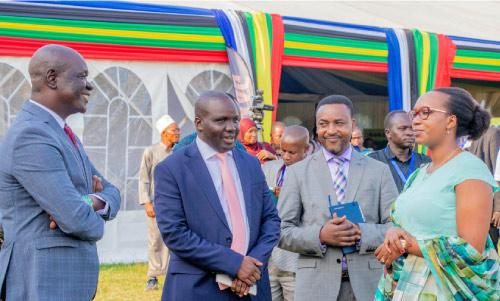East African Community Secretariat; Arusha, Tanzania; 10 April 2017:|
The Deputy Secretary General in charge of Productive and Social Sectors, Hon. Christophe Bazivamo, has commended the EAC Partner States for their willingness to promote Tourism and Wildlife Management sector in a coordinated manner as illustrated by their renewed commitment in supporting regional tourism development and wildlife conservation, in the overall context advancing the EAC integration agenda.
The Deputy Secretary General, who was addressing Partner States’ delegates attending the just concluded 7th Meeting of the Sectoral Council on Tourism and Wildlife Management in Kampala, Uganda, reiterated the need to continuously market the region as a single destination and the need for the region to enhance its marketing strategies not only internationally but also regionally.
Hon. Christophe Bazivamo further noted that in the last decade, the region had witnessed a decline in wildlife population exacerbated by poaching and illegal trafficking of wildlife and wildlife products and commended the discussions by Partner States on anti-poaching initiatives being carried out in the region by individual Partner states and how those initiatives could be merged into a regional action plan to deal with poaching activities of wildlife and wildlife products.
The 7th Meeting of the Sectoral Council on Tourism and Wildlife Management considered amongst others; implementation status of previous decisions and directives of the Sectoral Councils/Council; the draft Regional Strategy to Combat Poaching and Illegal Trafficking of Wildlife and Wildlife products; the draft Terms of Reference for the two Sub-Committees on Tourism and Wildlife Conservation and Management; and Progress report of the activities of the Tourism and Wildlife Management Sector in general, including the draft Protocol of Cooperation in Tourism and Wildlife Management. The implementation of the Single Tourist Visa by all partner states was also tabled.
The Chair of the Sectoral Council commended the good work done by the Partner States in deliberating on key issues and reviewing progresses in the implementation of previous decisions and recommending the way forward for efficient and successful implementation of the tourism development and wildlife conservation programs and initiatives by the EAC. More importantly, he underscored the focus by Partner States on how to enhance their individual synergies to create the much-needed visibility but also to strategize on how to become a competitive block in relation to other tourist destinations.
The EAC Council of Ministers have recognized the serious threats to the survival of many wildlife species in the region and recommended the EAC Secretariat to develop regional strategy to combat poaching and illegal trafficking of wildlife and wildlife products. That strategy has been developed and awaits adoption by the Sectoral Council for its implementation.
The Sectoral Council meeting in Kampala also noted that progress had been made by the EAC in marketing the region with the view of ensuring that the sector makes tangible impact on the lives of the people of the region. It was noted that the region stands to benefit holistically from the Single Tourist Visa Regime. Kenya, Rwanda and Uganda were commended for introducing and implementing the Single Tourist Visa.
The meeting directed the EAC Secretariat to expedite crafting of a road map to guide the full implementation of the Single Tourist Visa Regime by all EAC Partner States.
- ENDS -
For more information, please contact:
Mr Owora Richard Othieno
Head, Corporate Communications and Public Affairs Department
EAC Secretariat
Arusha, Tanzania
Tel: +255 784 835021
Email: OOthieno [at] eachq.org
About the East African Community Secretariat:
The East African Community (EAC) is a regional intergovernmental organisation of five Partner States, comprising Burundi, Kenya, Rwanda, Tanzania and Uganda, with its headquarters in Arusha, Tanzania.

